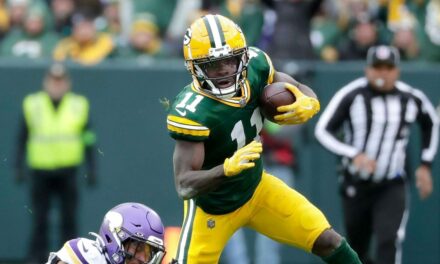The Green Bay Packers are a team in transition. Once the expected trade of Aaron Rodgers to the New York Jets goes through, the team will have a new starting quarterback for the first time since 2008 when Rodgers took over for Brett Favre.
When Jordan Love becomes the starter officially, head coach Matt LaFleur will be able to implement more of his own offense instead of the hybrid he’s been running that mixed what LaFleur wanted to do and what Rodgers was comfortable with from his days under Mike McCarthy.
That means significant changes in the way the offense is run.
Here are five things to expect more of from the Green Bay offense in 2023:
- Pre-Snap Motion
LaFleur comes out of the Kyle Shanahan tree of NFL coaches and the offense they like to run usually features a lot of pre-snap motion. The motion gives the quarterback a chance to determine before the ball is snapped whether the defense is in man or zone coverage and perhaps even what time of zone they are playing.
It also gives the offense a greater chance of scheming receivers open by moving them across the middle of the formation or having a defensive back get lost in the middle of the play while the receiver runs across the line of scrimmage.
The system that Rodgers used to run under McCarthy relied more on receivers winning one-on-one matchups downfield, something that was more difficult once Davante Adams left the team and they no longer had experienced elite receivers.
Look for more pre-snap motion in 2023 as LaFleur implements his offense in full without having to accommodate Rodgers.
- RPOs
Mobile quarterbacks are all the rage in the NFL right now and while Love is not as elusive a runner as Justin Fields or Jalen Hurts, he is more mobile at this stage of his career than the 39-year-old Rodgers is right now.
Love gives the Packers the opportunity to run more run-pass options. Those plays allow the quarterback to react to what the defense does and implement the right play to overcome it. If the defense commits to stopping the quarterback from running, he can force a defender to commit and then pitch to the running back. Or he can drop back and throw a quick pass downfield.
Rodgers was still capable of escaping the rush on occasion but lacked the mobility to effectively run RPOs at that stage of his career. It also didn’t play to his skills as a quarterback. Now, LaFleur can run more RPOs with Love.
- Emphasis on the RBs
The Packers most consistent weapons on offense remain running backs Aaron Jones and A.J. Dillon. LaFleur said at various times last season that the offense needed to get the ball in the hands of their running backs, especially Jones, more often to be effective. Unfortunately, he often got away from that and the team underutilized their backs for long stretches of games. When they did that, they usually lost.
It is not clear whether it was LaFleur who got away from getting the football to Jones and Dillon, or whether Rodgers was changing calls at the line of scrimmage. Either way, it is more likely that the running backs take on a slightly bigger role in the offense, whether it’s through more running plays being called or short passes.
The one season LaFleur called plays for the Tennessee Titans in 2018, they ran the ball a lot more than they did since he took over the Packers. While the 2023 offense is unlikely to go that far [the Titans had Derrick Henry], they will likely run the football more frequently than they did in recent years.
- More Throws Over the Middle
For whatever reason, Rodgers was reluctant to throw the football it the middle of the field on many occasions. Some observers say it was to keep his interception total down but regardless of why, most of Rodgers’ passes were thrown outside of the hashmarks.
Now, with Love as the starter, expect the offense to throw over the middle more frequently. Hopefully, that won’t also mean a large increase in the number of interceptions thrown.
- More Short Passes
Rodgers liked his chunk plays and often tried to incorporate the bomb into the game plan even when the team’s strengths didn’t lie in that area. This was especially noticeable in the first nine games of the 2022 campaign.
The team now has a legitimate deep threat in Christian Watson so the long passing game won’t disappear altogether, but Love is less likely to force those long passes downfield and LaFleur may be calling fewer of those deep passes while hoping the ones he does call are more effective.
Follow Gil Martin on Twitter @GilPackers
Click here for more great Packers coverage


